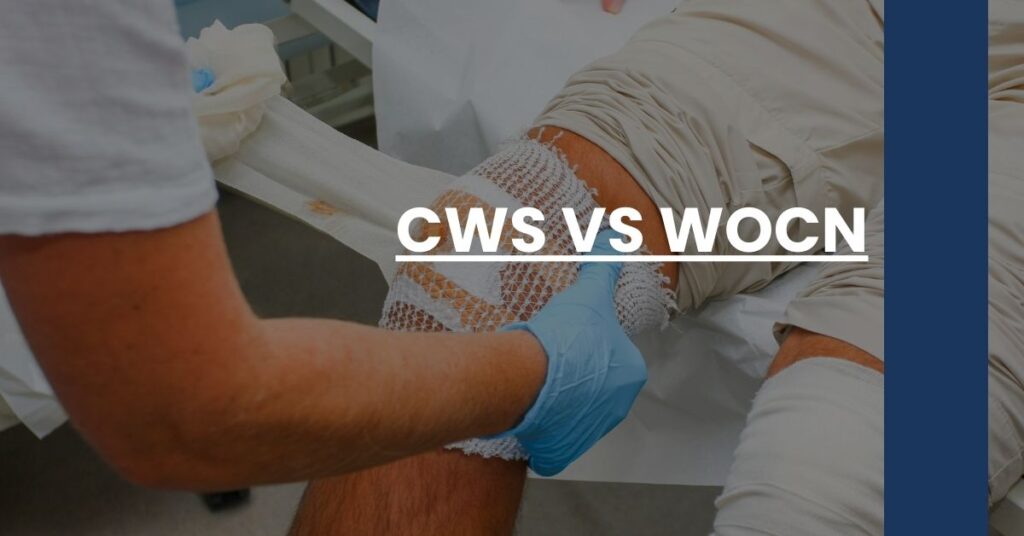CWS (Certified Wound Specialist) and WOCN (Wound, Ostomy, and Continence Nurse) are both certifications for professionals who specialize in wound care. A CWS is a master-level certification attainable by various healthcare practitioners, focused on demonstrating excellence in wound management. A WOCN is a nurse who has additional education and certification in managing wounds, ostomies, and continence.
In this article, you will learn:
- The educational and professional requirements for CWS and WOCN
- How each role contributes to patient care
- The differences and similarities in career advancement and impact
If you’re weighing CWS vs WOCN for your career, this concise guide serves as the perfect starting point for informed decision-making.
Introduction
Navigating the intricacies of healthcare certifications can be as challenging as a complex wound – there are layers to uncover and details that matter significantly. If you’re exploring the distinctions between a Certified Wound Specialist (CWS) and a Wound, Ostomy, and Continence Nurse (WOCN), you’ve likely witnessed the critical nature of specialized wound care and are considering how to advance your career in this path. These certifications represent a profound commitment to patient care, a desire to excel in a specialized field, and an aspirational journey towards clinical excellence in treating wounds, ostomy care, and continence management.
Understanding the CWS Certification
What Is a CWS?A Certified Wound Specialist (CWS) is a healthcare professional who exhibits an exceptional level of expertise in the field of wound management. Your interest in this certification suggests that you not only have significant experience in treating wounds but that you are ready to demonstrate a mastery that sets you apart in your field.
Educational and Professional RequirementsReaching the status of a CWS entails a rigorous journey, and it isn’t for everyone. You will need a bachelor’s degree at minimum, though many applicants come from a myriad of professional backgrounds, including physicians, nurses, and physical therapists. Additionally, you’re expected to bring a minimum of three years of clinical wound care experience to the table. The road to certification is paved with dedication to learning and patient care.
Scope of Practice As a CWS, your scope of practice is broad. You’ll take on comprehensive wound management cases, provide education to patients and colleagues, and often lead the charge in developing wound care protocols. You’ll be stepping into a role where your decisions can dramatically affect patient outcomes and quality of life.
Professional Responsibilities Perhaps the most enticing aspect of becoming a CWS is the opportunity to specialize and focus on advanced wound care techniques. You will not only treat but also predict and prevent complex wound scenarios. Moreover, as a leader, you may find yourself providing training to other healthcare providers, advocating for quality improvements in wound care, and staying atop the newest advances in the field.
The American Board of Wound Management provides detailed insights if you’re considering the pursuit of a CWS certification. This step is pivotal not only to your career advancement but to the lives of the patients who will benefit from your expertise.
Exploring the WOCN Certification
A WOCN, on the other hand, holds a unique place in nursing, catering to a specific set of patient needs.
What Is a WOCN?A Wound, Ostomy, and Continence Nurse is a super-specialized practitioner who deals with acute and chronic wounds, ostomy care, and continence issues. If you’re a nurse with an eye for these delicate and often complex patient care areas, WOCN could be your calling.
Educational Background NecessaryAchieving WOCN status means you’re not just well-versed in nursing; you’re diving deeper into a specialized nursing field. A bachelor’s degree in nursing is a stepping stone, followed by completing a WOCN-accredited education program that focuses on wound, ostomy, and continence care.
Contributions in Healthcare SettingsWith WOCN credentials, you bring a great deal more to the table than routine patient care. You become an educator, a consultant, and often a researcher within your healthcare setting. Your expertise in specific conditions results in a tangible elevation of the level of care and patient education provided within your institution.
For more understanding of the WOCN role and impact, the Journal of Wound, Ostomy, and Continence Nursing is an exemplary resource, offering current research and case studies that can serve as a beacon for your path forward.
Key Differences Between CWS and WOCN
Now, let’s dissect the main differences that set these two paths apart. As someone considering a future in either of these specialties, grasping these distinctions is essential.
Educational PathsThe foundational difference lies in the educational requirements. A CWS can come from various healthcare backgrounds, while a WOCN is exclusively a nursing domain. A CWS may have started their journey in various roles, whereas WOCNs are nurses first, specialists second.
Clinical ResponsibilitiesIn your role as a CWS, your primary focus is wound care across various settings, potentially serving a wider variety of patients. A WOCN, however, also handles ostomy and continence care, often forging deep connections with patients facing life-changing conditions.
Practice SettingsBoth CWS and WOCN professionals work in myriad environments – hospitals, long-term care facilities, research institutions, and as private consultants. A key difference is that WOCNs are also integral in surgical units and may have responsibilities directly tied to post-operative ostomy care and education.
Patient DemographicsWhile the CWS may encounter a diverse patient demographic, the WOCN often works with a subset that has undergone ostomy surgery or faces continence issues, frequently providing long-term support and care management.
The WOCN Certification Board offers a thorough comparison for those weighing CWS versus WOCN credentials, highlighting specifics that can help you make an informed decision about which certification aligns with your professional aspirations and passions.
Similarities in Career Outlook and Patient Care
Navigating the world of specialized wound care, the CWS and WOCN certifications share some fundamental similarities that highlight their value in healthcare. As you consider your path, understanding these parallels can assure you that, regardless of the choice, your certification will have a positive impact on patient care and your professional development.
Enhancing Patient CareBoth CWS and WOCN-certified professionals are trained to provide the highest standard of care. Your expertise will be crucial in a multidisciplinary team, where the integration of advanced wound care can significantly improve patient outcomes. You’ll find your skills in demand, not just within the operating room or outpatient clinic, but also in educational settings where teaching the next generation of caregivers becomes a part of your role.
Role in a Multidisciplinary TeamOn a day-to-day basis, you’ll seamlessly collaborate with physicians, therapists, and other nurses. As a certified expert, your recommendations carry weight, ensuring that patient care plans are comprehensive and evidence-based.
Job DemandIt’s an excellent time to specialize. The aging population and the prevalence of chronic diseases like diabetes mean skilled wound care is more crucial than ever. As either a CWS or a WOCN, you’ll join a workforce whose skills are in short supply and high demand, a reality that is reflected in the competitive salaries and job security these roles offer. Wound Educators affirm the market’s need for specialties like yours, indicating that your pursuit is not just professionally satisfying, but also economically wise.
Career Advancement and Professional Growth
The gravity of choosing between CWS and WOCN is not lost on you – it’s a decision that will shape your clinical identity and future.
Impact on Career TrajectoryYour certification becomes a gleaming symbol on your resume, a badge of specialized knowledge that propels you toward leadership roles and growth opportunities. Whether it’s training new staff, conducting groundbreaking research, or stepping into a managerial position, your potential for advancement courses prominently through your professional bloodstream.
Specialized FieldsThe training and knowledge you will have amassed allow branching into niches within healthcare that are typically beyond reach for those without certification. Specialty wound care clinics, home health agencies, and surgical teams will vie for your attention, offering the promise of variety and depth in your chosen career path.
Certification is an arduous yet rewarding journey. For those considering the CWS path, the American Board of Wound Management underscores the prestige that accompanies the achievement. For nursing professionals eyeing the WOCN track, remember that with your specialized skills, you can expect not just elevation in status but also in the personal fulfillment of patient care.
Making the Choice: CWS or WOCN?
When it comes to cws vs wocn, the decision is personal and multifaceted. It’s about aligning your passion with your profession, your dreams with the tangible needs of patients.
Personal Career Goals Before you move forward, reflect on where you see yourself in the coming years. Do you envision a broader impact across the healthcare spectrum, or a specialized focus in nursing?
Interest Levels It’s essential to gauge your enthusiasm for the core subjects of each certification. Are you more fascinated by the science of wound healing, or do the intricacies of ostomy and continence care call to you?
Desired Patient Population Consider whom you’re most compelled to help. CWS professionals often serve a varied clientele, while WOCNs may develop longer-term relationships with patients undergoing life-transforming surgical procedures.
As you ponder your professional direction, remember that both choices lead to places of great need and fulfillment. Detailed comparisons, available through resources like Wound Educators and certification board comparisons, offer clarity on both paths, assisting you as you take the next step toward your certification.
Conclusion
As we close the curtain on the cws vs wocn debate, we hope the clarity of your future role in wound care has sharpened. Whether you choose to walk the path of a Certified Wound Specialist or commit to the specialized nursing practice of a WOCN, your dedication to patient care marks the real victory. These certifications are not merely letters after your name; they’re powerful catalysts for professional and personal transformation, heralding a future where you stand as a staunch advocate and healer for those facing the trials of wound and ostomy care.
Choose your path wisely, and remember that at the heart of your decision lies a commitment to elevate the standard of care for patients whose lives will be transformed by your expertise, compassion, and skill.
CWS vs WOCN: Explore the differences in these wound care certifications to make an informed decision for your medical career.

